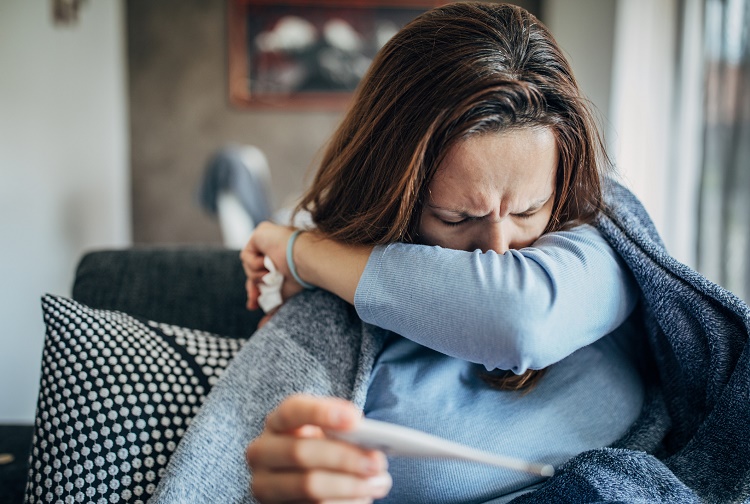
Risk of smell loss from COVID-19 is as low as 6% compared with initial variants
New study reveals that smell and taste loss is significantly less likely compared with the start of the pandemic, suggesting that smell loss is no longer a key symptom of infection.
June 05, 2023 At the beginning of the pandemic, smell and taste loss were some of the earliest signs of a COVID-19 infection. Now a person’s risk of losing smell and taste from COVID-19 has drastically dropped, according to new research. (Getty Images)
At the beginning of the pandemic, smell and taste loss were some of the earliest signs of a COVID-19 infection. Now a person’s risk of losing smell and taste from COVID-19 has drastically dropped, according to new research. (Getty Images)
By Olivia Trani
The risk of losing your sense of smell and taste from the most recent COVID-19 omicron variants is only 6-7% of what it was during the early stages of the pandemic, according to a new study led by researchers at Virginia Commonwealth University’s School of Medicine. The findings were published in the journal Otolaryngology — Head and Neck Surgery.
“At the beginning of the pandemic, smell and taste loss were considered common symptoms of COVID-19. Before viral tests were readily accessible, we relied a lot more on such symptoms to diagnose those infected. However, as different variants of the COVID-19 virus have emerged, the types of symptoms most commonly experienced changed as well,” said Evan Reiter, M.D., who is the medical director of VCU Health’s Smell and Taste Disorders Center, a professor in the Department of Otolaryngology at the VCU School of Medicine and lead author of the new study.
For this research, Reiter was joined by Daniel Coelho, M.D., a professor in the Department of Otolaryngology; Richard Costanzo, Ph.D., a professor emeritus in the Department of Physiology and Biophysics; and Evan French, a research informatics systems analyst at VCU’s C. Kenneth and Dianne Wright Center for Clinical and Translational Research.
The researchers accessed data from a national database of more than 7 million patients who tested positive for COVID-19 since the pandemic accelerated in 2020. Using this data, they calculated the prevalence of smell and taste loss as a symptom of COVID-19 during peak periods of infection for each variant wave.
They found that the risks of smell loss from a COVID-19 infection for alpha and delta, two of the most pervasive variants in 2021, were only 74% and 64% of what was observed in the early stages of the pandemic. Even steeper declines in smell loss were observed in 2022 and early 2023, when omicron variants were the most dominant strains of the COVID-19 virus. During this period, the risk of smell loss from infection was as low as 6% compared with 2020 rates.
The study doesn't calculate the absolute percent risk of smell loss from COVID-19 today, but rather compares it with the risk of smell loss from early 2020. The researchers set the chance of smell loss in early 2020 as the “100%” baseline and found that the chance of smell loss from the most recent omicron variants is just 6-7% of that baseline.
“This data shows that smell and taste loss is no longer a reliable indicator of COVID-19 infection,” Reiter said. “This means that you can’t rule out COVID-19 if you are feeling sick but haven’t lost your sense of smell. This also means that if you have lost your sense of smell, it’s not a guarantee that it’s from a COVID-19 infection.”
While it’s unclear exactly why the prevalence of smell loss has dropped over time, higher immunity to the virus could be a factor.
“We don’t have the data on what’s causing this decline in smell loss as a symptom of COVID-19, but I would speculate that this might be related to our increased immunity to the virus, either through vaccines or having an earlier infection, as this typically helps reduce the severity of future infections,” Reiter said.
He and his colleagues noted that the next steps for the scientific community include continuing to research potential treatments for those still affected by smell loss from COVID-19.
For example, Coelho and Costanzo have led a team of researchers focused on developing an implant device to restore sense of smell, much like a cochlear implant restores hearing. The project has been in development for several years but has received international interest since the onset of the pandemic.
A previously published nationwide survey co-authored by Coelho, Reiter and Costanzo revealed that after two years since infection, 7.5% of people who developed smell loss from COVID-19 had not regained the sense, and 54% only partially recovered it.
“While the risk of smell loss is far less prevalent than the initial waves of COVID-19, we are still seeing patients who have either completely lost or have a distorted sense of smell, which can take a significant toll on their quality of life. There are a fair number of patients who have trouble maintaining a healthy diet because there are so many foods that are displeasing to them,” Reiter said. “Luckily, there is a lot of work being done in hopes of finding an effective treatment for those affected by this condition.”
The new study received grant funding from the MEDARVA Foundation. The VCU research informatics team that provided data from the National COVID Cohort Collaborative was partially funded by the National Institutes of Health’s Clinical and Translational Science Award, awarded to VCU’s Wright Center.
A version of this story was originally published by VCU News.



